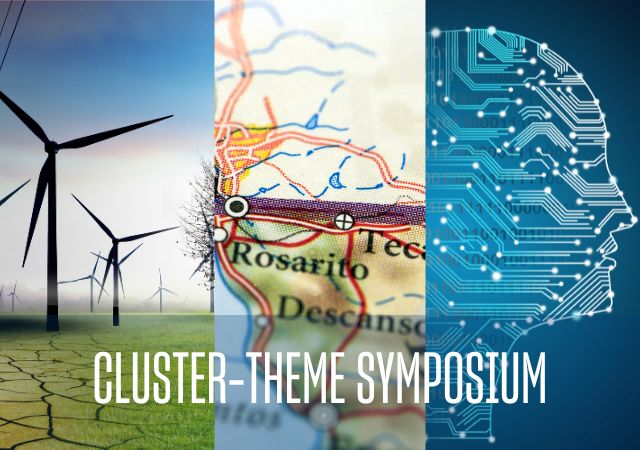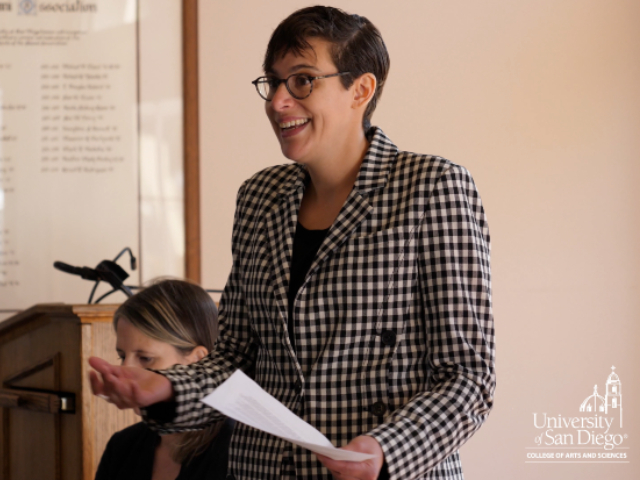Faculty Call for Summer 2023 Class – The Changing Face of Humanity: AI and Identities of the Future (HUMC 294)
Faculty Call for Summer 2023 Class
HUMC 294: The Changing Face of Humanity: AI and Identities of the Future
CLASS DESCRIPTION
Since 2020, the 1st@USD summer seminar has welcomed incoming first-year students to USD’s liberal arts approach to higher education. Students are invited to join a group of instructors from across the university in a one-credit seminar that introduces them to interdisciplinary intellectual inquiry and academic curiosity through engaging discussions and collective critical thinking.
We invite faculty to participate in our 2023 1st@USD seminar: “The Changing Face of Humanity: AI and Identities of the Future.” Faculty will propose a topic for a 20-minute lecture teaching students how to interrogate identity in a world shaped by technology. What does it mean to be human and a global citizen when artificial intelligence is shaping our world? Who will we be as humans as we create, learn about, and interact in unprecedented ways with technology? Where do the limits of human intelligence end and the intelligence of machines begin? How do the identities of the 21st century affect students’ unique perspectives on the world, in addition to their knowledge of complex issues that impact our lives and the lives of others? As a faculty, what concepts, knowledge, tools, and questions do we wish to impart to students so that they understand what it means to explore their own identities in the face of AI and new technologies? What can AI teach us about intelligence and the nature of knowledge and learning? How can students build and restore identities through technology with a critically-informed lens? In exploring identity, how can we foster students’ ability to analyze, create, and participate in ways that shape society for their futures?
All USD faculty are encouraged to submit a brief proposal that highlights the interdisciplinarity of USD’s liberal arts education. This seminar introduces first-year students to the different ways that disciplines embrace, reject, and question artificial intelligence and its impact on humanness and identity into the future in the context of the nature of knowledge and learning.
Questions that might be addressed by faculty in any discipline include (but are not limited to):
I. General questions about AI and identities of the future:
- How do we distinguish between the Human and the AI? Who (or what) wrote it, who generated, or created the images/text/video? What are humans teaching AI, and what is AI (in its various manifestations) teaching us?
- What are crucial concepts in your field that are critical for understanding the historical, philosophical, and/or experiential underpinnings of artificial intelligence, emerging technologies, the posthuman, or the transhuman?
- Within your discipline, what knowledge historically frames and shapes the concepts of human, animal, and/or machine identity?
- What could the notion of AI and future identities mean? Are there proposals for an outright rejection of AI or technology?
- In what ways do humans, societies, and systems influence notions of intelligence, identity, and human nature ?
- What is the relationship between AI, the posthuman, and/or the transhuman to simulacra?
- What is the relationship between identity, technology, community, duty, and agency?
- In what circumstances should AI be used or not used? Why or why not? Who is responsible when AI causes harm?
- In the Era of Information, what role does the media play in communicating about the development and maintenance of identity, intelligence, and knowledge?
- What values of leadership are necessary in the creation and maintenance of AI and non-human identities?
II. Topics, concepts, and facts critical to AI, identities of the future, and the nature of knowledge and learning:
- How should we define intelligence in relation to identity, agency, authenticity, ethics, inclusivity, science, and technology?
- How can we rethink notions of author and authorship, originality, copies, and originals in the context of AI?
- How do intercultural competence and language processing inform AI, identity, and global citizenship in the 21st century?
- How do textual and visual creations/representations contribute to debates on the limits of intelligence, identity, and the nature of humanity? What can speculative cinema or fiction and dystopian art teach us about the future of humanity and technology?
- How do scientific and technological innovations affect our problem solving, conceptions of intelligence, and our human identities?
- To what extent do social media and virtual avatars serve as extensions and representations of our human identity? How do influencers manipulate and/or utilize AI in innovative or controversial ways?
- How do textual and visual creations/representations contribute to debates on the limits of intelligence, identity, and the nature of humanity?
- What can a knowledge and understanding of engineering principles or algorithms contribute to the formation of AI and modern-day identities in a scientifically advancing world?
- What can a knowledge and understanding of economic theory and business principles contribute to the development and regulation of AI?
- What role do AI, machine learning, and prosthetics play in relation to medicine, public health, identity, agency, and ethics?
- In what ways do our various roles within society inform and support notions of identity, intelligence, and the nature of knowledge and learning?
- What role does human agency play in the relationship between non-human identity, the posthuman, the transhuman, and/or human identity?
- How can our reflection on AI, technology, identity, and the nature of knowledge help us to understand and provide solutions to deeper social issues, such as racism and the politics of migration, that reside at the intersection of a variety of disciplines?
- What scientific and societal knowledge should we share in order to take meaningful action in light of current concerns of capitalism, global warming, and the development of advanced war and military technology?
- Are there any advances in AI knowledge or technology that pose risks to human identity and global communities?
CLASS STRUCTURE
This synchronous interdisciplinary class will consist of five weekly team-taught sessions and will be offered via Zoom to newly admitted first-year students this summer, beginning in mid-late July and ending in mid-August. Each of the five class sessions will last two hours, with 3-4 faculty members presenting during a single session (sessions will be recorded for later viewing). Incoming first-year students will be invited to participate in this exciting academic opportunity, which is entirely voluntary. Students who successfully complete the five-week course will receive 1 unit of lower-division elective credit. To encourage participation and intellectual exploration without the pressure to achieve a high letter grade, grading will be pass/no credit only. We will provide this class at no cost to the students.
CALL AND APPLICATION PROCESS
We will accept up to 20 faculty across a range of disciplines to present one 20-minute presentation and moderate two one-hour discussions related to the seminar’s theme. Each week will be organized by theme, and faculty will be expected to collaborate with their colleagues to assign a reading and design a short assignment for the week. Selected faculty will receive a $600 stipend for presenting, moderating, and grading. We encourage faculty to attend each week’s sessions for the duration of the seminar. Interested participants should submit a brief statement of interest (no more than one page) that includes the topic(s) they would like to teach and how their approach connects to the theme and to other disciplines.
Applications should be submitted via this google form by Friday, May 19, at 5 p.m. PDT. Statements will be evaluated by the leadership team, and faculty will be notified of acceptance by Friday, May 26.
If you have any questions, please contact Associate Dean Ron Kaufmann at kaufmann@sandiego.edu.
Direct link to submission form: https://forms.gle/7LCjaVgzoUyoQcQo8.



